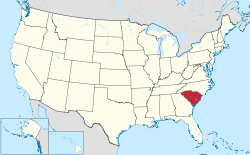 | |
| Number of elections | 59 |
|---|---|
| Voted Democratic | 28 |
| Voted Republican | 18 |
| Voted Whig | 2 |
| Voted Democratic-Republican | 7 |
| Voted other | 4 [a] |
| Voted for winning candidate | 34 |
| Voted for losing candidate | 25 |
Following is a table of United States presidential elections in South Carolina, ordered by year. Since its admission to statehood in 1788, South Carolina has participated in every U.S. presidential election except the election of 1864 during the American Civil War, when the state had seceded to join the Confederacy.
Contents
- Elections from 1864 to present
- Election of 1860
- Elections from 1788-1789 to 1856
- See also
- Notes
- References
Winners of the state are in bold. The shading refers to the state winner, and not the national winner.